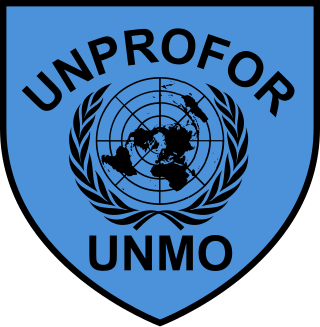
The United Nations Protection Force was the first United Nations peacekeeping force in Croatia and in Bosnia and Herzegovina during the Yugoslav Wars. The force was formed in February 1992 and its mandate ended in March 1995, with the peacekeeping mission restructuring into three other forces.

United Nations Security Council resolution 819, adopted unanimously on 16 April 1993, after reaffirming resolutions 713 (1991) and all (1992) subsequent resolutions, the Council expressed concern at the actions of Bosnian Serb paramilitary units in towns and villages in eastern Bosnia and Herzegovina, including attacks on civilians, the United Nations Protection Force and disruption to humanitarian aid convoys. The resolution marked the UN's first civilian "safe area" being declared; it failed to prevent the Srebrenica massacre.

United Nations Security Council resolution 771, adopted unanimously on 13 August 1992, after reaffirming resolutions 713 (1991), 721 (1991), 724 (1991), 727 (1992), 740 (1992), 743 (1992), 749 (1992), 752 (1992), 757 (1992), 758 (1992), 760 (1992), 761 (1992), 762 (1992), 764 (1992), 769 (1992) and 770 (1992), the council expressed concern at and condemned widespread violations of international humanitarian law in the territory of the former Yugoslavia and in particular, Bosnia and Herzegovina.
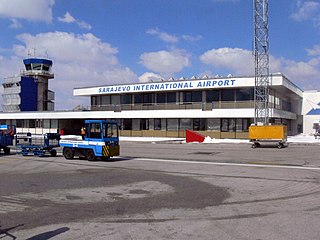
United Nations Security Council Resolution 781 was adopted on 9 October 1992. After reaffirming Resolution 713 (1991) and all the subsequent resolutions on the situation in the former Yugoslavia, the Council decided to impose a ban on military flights in the airspace over Bosnia and Herzegovina, acting in accordance with the provisions set out in Resolution 770 (1992).

United Nations Security Council resolution 786, adopted unanimously on 10 November 1992, after reaffirming Resolution 781 (1992), the Council approved a recommendation by the Secretary-General Boutros Boutros-Ghali to increase the strength of the United Nations Protection Force (UNPROFOR) in Bosnia and Herzegovina by 75 observers to monitor the ban on military flights over the country.

United Nations Security Council resolution 787, adopted on 16 November 1992, after reaffirming Resolution 713 (1991) and all subsequent resolutions on the topic, the council called upon the parties in Bosnia and Herzegovina to consider the draft outline constitution as a basis for negotiating a political settlement of the conflict in the country, and went on to impose further international sanctions on the Federal Republic of Yugoslavia.

United Nations Security Council resolution 820, adopted on 17 April 1993, after reaffirming all previous resolutions on the topic for a lasting peace settlement in Bosnia and Herzegovina and the region, the council discussed the peace plan for Bosnia and Herzegovina and comprehensive steps to ensure its implementation.

United Nations Security Council resolution 824, adopted unanimously on 6 May 1993, after considering a report by the Secretary-General Boutros Boutros-Ghali pursuant to Resolution 819 (1993), the council discussed the treatment of certain towns and surroundings as "safe areas" in Bosnia and Herzegovina.
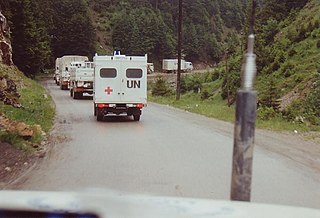
United Nations Security Council resolution 836 was adopted on 4 June 1993. After reaffirming Resolution 713 (1991) and all subsequent resolutions on the situation in the former Yugoslavia, the Council expressed its alarm at the continuing situation in Bosnia and Herzegovina and decided to expand the mandate of the United Nations Protection Force (UNPROFOR) by allowing it to use force to protect the "safe areas".
United Nations Security Council resolution 844, adopted unanimously on 18 June 1993, after reaffirming Resolution 713 (1991) and subsequent resolutions, the Council noted deteriorating situation in Bosnia and Herzegovina and authorised a reinforcement of the United Nations Protection Force (UNPROFOR).

United Nations Security Council resolution 859, adopted unanimously on 24 August 1993, after recalling all resolutions on the situation in Bosnia and Herzegovina, the council noted that, despite all previous security council resolutions since Resolution 713 (1991), the region was still a scene of hostilities and there was little compliance with previous resolutions, particularly by the Bosnian Serb party.
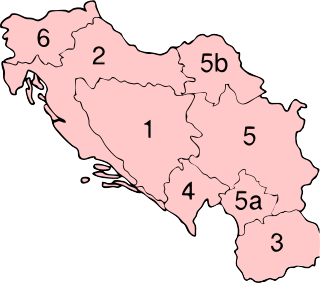
United Nations Security Council resolution 871, adopted unanimously on 4 October 1993, after reaffirming resolutions 713 (1992) and 743 (1992) and subsequent resolutions relating to the situation in the former Yugoslavia and United Nations Protection Force (UNPROFOR), the Council expressed concern that United Nations peacekeeping plan for Croatia, in particular Resolution 769 (1992), had not been implemented and went on to discuss the peace plan and extend UNPROFOR's mandate until 31 March 1994.

United Nations Security Council resolution 900, adopted on 4 March 1994, after reaffirming all resolutions on the situation in Bosnia and Herzegovina, the Council discussed the restoration of essential public services and normal life in and around the capital Sarajevo.

United Nations Security Council resolution 913 was adopted unanimously on 22 April 1994, after reaffirming all resolutions on the situation in Bosnia and Herzegovina and also Resolution 908 (1994). The Council discussed the situation in the safe area of Goražde and a settlement of the conflict.
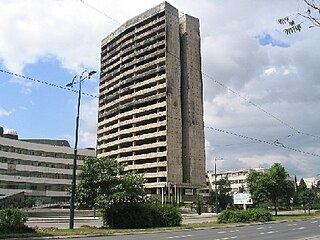
United Nations Security Council resolution 959, adopted unanimously on 19 November 1994, after recalling all resolutions on the situation in Bosnia and Herzegovina including resolutions Resolution 824 (1993) and Resolution 836 (1993), the Council discussed the efforts of the United Nations Protection Force (UNPROFOR) to ensure the implementation of security council resolutions in the safe areas of Bosnia and Herzegovina.

United Nations Security Council resolution 998, adopted on 16 June 1995, after reaffirming all resolutions on the conflicts in the former Yugoslavia, in particular Resolution 982 (1994), the council established a rapid reaction force of up to 12,500 personnel within the United Nations Protection Force (UNPROFOR) in Bosnia and Herzegovina following attacks on it and the overall deteriorating situation.

United Nations Security Council resolution 1004, adopted unanimously on 12 July 1995, after recalling all resolutions on the situation in the former Yugoslavia, the council, acting under Chapter VII of the United Nations Charter, demanded that Bosnian Serb forces withdraw from the safe area of Srebrenica in Bosnia and Herzegovina and respect the safety of personnel from the United Nations Protection Force (UNPROFOR). The resolution was passed during the Srebrenica massacre.

United Nations Security Council resolution 1009, adopted unanimously on 10 August 1995, after recalling all resolutions on the situation in the former Yugoslavia including resolutions 981 (1995), 990 (1995) and 994 (1995), the Council demanded that the Government of Croatia strictly observe Security Council resolutions after an offensive by the Croatian Army began on 4 August 1995.
United Nations Security Council resolution 1019, adopted unanimously on 9 November 1995, after recalling resolutions 1004 (1995) and 1010 (1995) on the situation in Bosnia and Herzegovina and 1009 (1995) concerning Croatia, the Council discussed violations of international humanitarian law in the former Yugoslavia.

United Nations Security Council resolution 1034, adopted unanimously on 21 December 1995, after recalling previous resolutions including Resolution 1019 (1995), the Council discussed violations of international humanitarian law in the former Yugoslavia, specifically in Bosnia and Herzegovina.
















